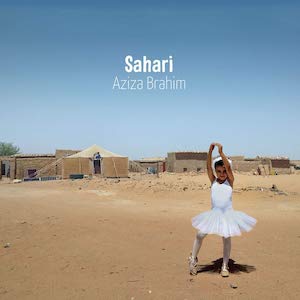 Aziza Brahim – Sahari
Aziza Brahim – Sahari
Glitterbeat Records – Out Now
When discussing the chosen release at our monthly Union Music Store Album Club, a recurring topic of conversation revolves around how much of an artist’s personal circumstances, if any, should be taken into account when debating their music. The recent choice of Edwin Collins’s Badbea being a prime case in point. When considering Sahari, the latest record from Aziza Brahim, it seems inconceivable, to me at least, that any meaningful evaluation of the music could take place in a vacuum without reference to her past.
Aziza was born in 1976 in the Saharawi refugee camps in the Tindouf region of Algeria, after her mother, already pregnant with her, had fled following the Moroccan military invasion and occupation of her West Saharan homeland. Her father stayed in the capital city, but the nigh-on 3,000 km long wall built across the Saharawi land, by the Moroccan army, meant that she would never get to meet him before his death. Western Sahara remains a disputed territory, with Saharawis on both sides of the wall still desperately hoping for a resolution to the situation.
From a young age, Aziza discovered a passion for music, something encouraged by the female members of her family, most of whom are also poets or musicians. Aged 11 she received a scholarship to study in Cuba, but returned to the refugee camps in 1995, to pursue a musical career, after she was rejected in her quest to study a music degree. Since 2000 she has lived in exile in Spain.
Aziza’s music mirrors both the aspirations and misery of her people, and Sahari, written in Spain, sees her widen her focus; yes the songs remain firmly rooted in her homeland, but there is a move towards a more global outlook. This is most readily apparent in the introduction of electronics into the sound, with programming and keyboards being employed alongside the tabal drum, the instrument at the heart of traditional Saharawi music. Much in the same way that younger folk musicians in the UK have brought modernity in their interpretations of the old, so Aziza melds the past with the present and integrates African and European sounds to deliver her message. The result is a wonderfully eclectic mix of diverse music on a stunningly beautiful album.
Opening with Cuatro Proverbios, an example of haul, Saharawi traditional music where the vocals are backed by the tabal, and sung, as are all but one of the songs on the release, in Hassaniya, the Arabic dialect spoken in the Western Sahara, Aziza actually employs two different tabal to create a more expansive sound. In contrast, title track, Sahari, with its plaintive message of yearning for home from one in exile, incorporates hypnotic beats over electric guitars, as Aziza declares (in translation)
‘The years have passed, gone by, gone,
And here I am, desperate for my freedom.
The years have passed, gone by, goner
And I’m here, hungry for freedom’
Hada Jil, a celebration of the power of youth, has an almost reggae-like feel, whilst Lmanfa, (Exile), with its beautiful, lilting melody, showcases Aziza’s empyrean vocal talent. Entrancing and all-enveloping in equal measure, there is much to admire, sonically, in Mujayam (Camps), a defiant and powerful reminder of the underlying purpose that fuels her writing
‘You can cage the bird
But you cannot silence its song’
The genuinely uplifting and gleeful Leil features outstanding examples of ezgarit, the sound emitted by Saharawi women with a movement of the tongue at high speed to manifest their joy, before the soulful Masaa Tufulati, reminiscent of Osibisa at their most serene, brings the tempo down in a mellow song of great charm.
Previously, Aziza has affirmed that she can’t separate her political side from her cultural one, and with Ard El Hub, (Land of Love), her personal feelings, emotions, notions of resistance and aspirations are perfectly exemplified. With lyrics by Zaim Alal, the song’s gentleness is its great strength, as the song speaks of, in her words “the impossibility of returning to the homeland for us.”
‘My homeland, the land of love,
The cradle of my childhood,
To you the longings rise
That embrace the sky’
The penultimate track, Las Huellas, the only one on the release sung in Spanish, is an out-and-out reggae groove complete with sax, whilst album closer, Ahlami, delivered with haunting vocals in front of a minimal, but nonetheless alluring backing, with its plaintive listing of villages and locations in the disputed Western Sahara, is the perfect way to remind the listener of the message inherent in her music.
Unashamedly, Aziza’s avowed purpose is ‘… to denounce the extreme living conditions there and the great injustice that prevents Saharawi refugees from returning to their home.’ That she does so not only through lyrics which so passionately express the injustices felt, but also through music which both entertains and touches the heart in equal measure, is a testament to her artistry.
Sahari is a truly captivating release, with melodies that will linger long in the memory. There is great power to be found in the juxtaposition of the hurt, anger and resistance with the unbridled optimism in the dream for the end to the struggle, but the album speaks to more than just the specifics of Western Sahara, its hope is that the world will learn not only to open its heart and mind to the Saharawi, but to all refugees.
